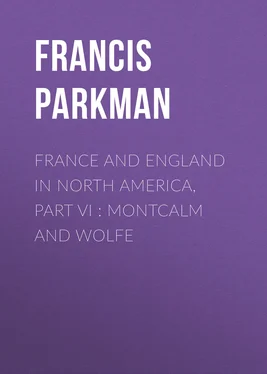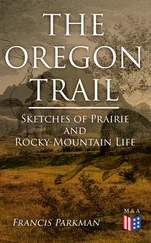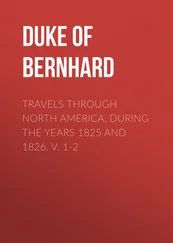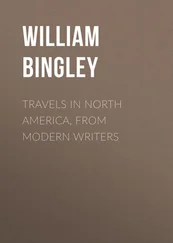Francis Parkman - France and England in North America, Part VI - Montcalm and Wolfe
Здесь есть возможность читать онлайн «Francis Parkman - France and England in North America, Part VI - Montcalm and Wolfe» — ознакомительный отрывок электронной книги совершенно бесплатно, а после прочтения отрывка купить полную версию. В некоторых случаях можно слушать аудио, скачать через торрент в формате fb2 и присутствует краткое содержание. Жанр: foreign_prose, История, foreign_edu, foreign_antique, на английском языке. Описание произведения, (предисловие) а так же отзывы посетителей доступны на портале библиотеки ЛибКат.
- Название:France and England in North America, Part VI : Montcalm and Wolfe
- Автор:
- Жанр:
- Год:неизвестен
- ISBN:нет данных
- Рейтинг книги:5 / 5. Голосов: 1
-
Избранное:Добавить в избранное
- Отзывы:
-
Ваша оценка:
- 100
- 1
- 2
- 3
- 4
- 5
France and England in North America, Part VI : Montcalm and Wolfe: краткое содержание, описание и аннотация
Предлагаем к чтению аннотацию, описание, краткое содержание или предисловие (зависит от того, что написал сам автор книги «France and England in North America, Part VI : Montcalm and Wolfe»). Если вы не нашли необходимую информацию о книге — напишите в комментариях, мы постараемся отыскать её.
France and England in North America, Part VI : Montcalm and Wolfe — читать онлайн ознакомительный отрывок
Ниже представлен текст книги, разбитый по страницам. Система сохранения места последней прочитанной страницы, позволяет с удобством читать онлайн бесплатно книгу «France and England in North America, Part VI : Montcalm and Wolfe», без необходимости каждый раз заново искать на чём Вы остановились. Поставьте закладку, и сможете в любой момент перейти на страницу, на которой закончили чтение.
Интервал:
Закладка:
Of the other colonies, the briefest mention will suffice: New Jersey, with its wholesome population of farmers; tobacco-growing Maryland, which, but for its proprietary government and numerous Roman Catholics, might pass for another Virginia, inferior in growth, and less decisive in features; Delaware, a modest appendage of Pennsylvania; wild and rude North Carolina; and, farther on, South Carolina and Georgia, too remote from the seat of war to take a noteworthy part in it. The attitude of these various colonies towards each other is hardly conceivable to an American of the present time. They had no political tie except a common allegiance to the British Crown. Communication between them was difficult and slow, by rough roads traced often through primeval forests. Between some of them there was less of sympathy than of jealousy kindled by conflicting interests or perpetual disputes concerning boundaries. The patriotism of the colonist was bounded by the lines of his government, except in the compact and kindred colonies of New England, which were socially united, though politically distinct. The country of the New Yorker was New York, and the country of the Virginian was Virginia. The New England colonies had once confederated; but, kindred as they were, they had long ago dropped apart. William Penn proposed a plan of colonial union wholly fruitless. James II. tried to unite all the northern colonies under one government; but the attempt came to naught. Each stood aloof, jealously independent. At rare intervals, under the pressure of an emergency, some of them would try to act in concert; and, except in New England, the results had been most discouraging. Nor was it this segregation only that unfitted them for war. They were all subject to popular legislatures, through whom alone money and men could be raised; and these elective bodies were sometimes factious and selfish, and not always either far-sighted or reasonable. Moreover, they were in a state of ceaseless friction with their governors, who represented the king, or, what was worse, the feudal proprietary. These disputes, though varying in intensity, were found everywhere except in the two small colonies which chose their own governors; and they were premonitions of the movement towards independence which ended in the war of Revolution. The occasion of difference mattered little. Active or latent, the quarrel was always present. In New York it turned on a question of the governor's salary; in Pennsylvania on the taxation of the proprietary estates; in Virginia on a fee exacted for the issue of land patents. It was sure to arise whenever some public crisis gave the representatives of the people an opportunity of extorting concessions from the representative of the Crown, or gave the representative of the Crown an opportunity to gain a point for prerogative. That is to say, the time when action was most needed was the time chosen for obstructing it.
In Canada there was no popular legislature to embarrass the central power. The people, like an army, obeyed the word of command,—a military advantage beyond all price.
Divided in government; divided in origin, feelings, and principles; jealous of each other, jealous of the Crown; the people at war with the executive, and, by the fermentation of internal politics, blinded to an outward danger that seemed remote and vague,—such were the conditions under which the British colonies drifted into a war that was to decide the fate of the continent.
This war was the strife of a united and concentred few against a divided and discordant many. It was the strife, too, of the past against the future; of the old against the new; of moral and intellectual torpor against moral and intellectual life; of barren absolutism against a liberty, crude, incoherent, and chaotic, yet full of prolific vitality.
CHAPTER II.
1749-1752
La Galissonière • English Encroachment • Mission of Céloron • The Great West • Its European Claimants • Its Indian Population • English Fur-Traders • Céloron on the Alleghany • His Reception • His Difficulties • Descent of the Ohio • Covert Hostility • Ascent of the Miami • La Demoiselle • Dark Prospects for France • Christopher Gist • George Croghan • Their Western Mission • Pickawillany • English Ascendency • English Dissension and Rivalry • The Key of the Great West.
When the peace of Aix-la-Chapelle was signed, the Marquis de la Galissonière ruled over Canada. Like all the later Canadian governors, he was a naval officer; and, a few years after, he made himself famous by a victory, near Minorca, over the English admiral Byng,—an achievement now remembered chiefly by the fate of the defeated commander, judicially murdered as the scapegoat of an imbecile ministry. Galissonière was a humpback; but his deformed person was animated by a bold spirit and a strong and penetrating intellect. He was the chief representative of the American policy of France. He felt that, cost what it might, she must hold fast to Canada, and link her to Louisiana by chains of forts strong enough to hold back the British colonies, and cramp their growth by confinement within narrow limits; while French settlers, sent from the mother-country, should spread and multiply in the broad valleys of the interior. It is true, he said, that Canada and her dependencies have always been a burden; but they are necessary as a barrier against English ambition; and to abandon them is to abandon ourselves; for if we suffer our enemies to become masters in America, their trade and naval power will grow to vast proportions, and they will draw from their colonies a wealth that will make them preponderant in Europe. 2 2 La Galissonière, Mémoire sur les Colonies de la France dans l'Amérique septentrionale .
The treaty had done nothing to settle the vexed question of boundaries between France and her rival. It had but staved off the inevitable conflict. Meanwhile, the English traders were crossing the mountains from Pennsylvania and Virginia, poaching on the domain which France claimed as hers, ruining the French fur-trade, seducing the Indian allies of Canada, and stirring them up against her. Worse still, English land speculators were beginning to follow. Something must be done, and that promptly, to drive back the intruders, and vindicate French rights in the valley of the Ohio. To this end the Governor sent Céloron de Bienville thither in the summer of 1749.
He was a chevalier de St. Louis and a captain in the colony troops. Under him went fourteen officers and cadets, twenty soldiers, a hundred and eighty Canadians, and a band of Indians, all in twenty-three birch-bark canoes. They left La Chine on the fifteenth of June, and pushed up the rapids of the St. Lawrence, losing a man and damaging several canoes on the way. Ten days brought them to the mouth of the Oswegatchie, where Ogdensburg now stands. Here they found a Sulpitian priest, Abbé Piquet, busy at building a fort, and lodging for the present under a shed of bark like an Indian. This enterprising father, ostensibly a missionary, was in reality a zealous political agent, bent on winning over the red allies of the English, retrieving French prestige, and restoring French trade. Thus far he had attracted but two Iroquois to his new establishment; and these he lent to Céloron.
Reaching Lake Ontario, the party stopped for a time at the French fort of Frontenac, but avoided the rival English post of Oswego, on the southern shore, where a trade in beaver skins, disastrous to French interests, was carried on, and whither many tribes, once faithful to Canada, now made resort. On the sixth of July Céloron reached Niagara. This, the most important pass of all the western wilderness, was guarded by a small fort of palisades on the point where the river joins the lake. Thence, the party carried their canoes over the portage road by the cataract, and launched them upon Lake Erie. On the fifteenth they landed on the lonely shore where the town of Portland now stands; and for the next seven days were busied in shouldering canoes and baggage up and down the steep hills, through the dense forest of beech, oak, ash, and elm, to the waters of Chautauqua Lake, eight or nine miles distant. Here they embarked again, steering southward over the sunny waters, in the stillness and solitude of the leafy hills, till they came to the outlet, and glided down the peaceful current in the shade of the tall forests that overarched it. This prosperity was short. The stream was low, in spite of heavy rains that had drenched them on the carrying place. Father Bonnecamp, chaplain of the expedition, wrote, in his Journal: "In some places—and they were but too frequent—the water was only two or three inches deep; and we were reduced to the sad necessity of dragging our canoes over the sharp pebbles, which, with all our care and precaution, stripped off large slivers of the bark. At last, tired and worn, and almost in despair of ever seeing La Belle Rivière, we entered it at noon of the 29th." The part of the Ohio, or "La Belle Rivière," which they had thus happily reached, is now called the Alleghany. The Great West lay outspread before them, a realm of wild and waste fertility.
Читать дальшеИнтервал:
Закладка:
Похожие книги на «France and England in North America, Part VI : Montcalm and Wolfe»
Представляем Вашему вниманию похожие книги на «France and England in North America, Part VI : Montcalm and Wolfe» списком для выбора. Мы отобрали схожую по названию и смыслу литературу в надежде предоставить читателям больше вариантов отыскать новые, интересные, ещё непрочитанные произведения.
Обсуждение, отзывы о книге «France and England in North America, Part VI : Montcalm and Wolfe» и просто собственные мнения читателей. Оставьте ваши комментарии, напишите, что Вы думаете о произведении, его смысле или главных героях. Укажите что конкретно понравилось, а что нет, и почему Вы так считаете.












